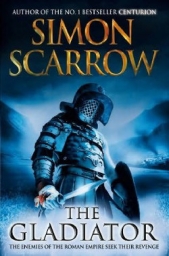The Gladiator

The Gladiator читать книгу онлайн
Внимание! Книга может содержать контент только для совершеннолетних. Для несовершеннолетних чтение данного контента СТРОГО ЗАПРЕЩЕНО! Если в книге присутствует наличие пропаганды ЛГБТ и другого, запрещенного контента - просьба написать на почту [email protected] для удаления материала
'He's a good man,' Sempronius said. 'You're lucky to have him as a friend.'
'I know that, sir.'
Sempronius turned to Cato and was silent for a moment.' Do you have any idea where that gladiator is headed?'
Cato nodded.' Once he put out to sea, the ship was seen to turn south, sir. Towards Africa.'
'I see.' Sempronius cleared his throat and stood back. 'You have your orders, Prefect. See they are carried out.'
'Yes, sir!' Cato stood to attention and saluted. He turned to see that the last of his stores had been carried aboard. There would be no privacy for his final parting with Julia. He took her hands, feeling the tremor of her flesh against his as she did her best not to let any tears show. He leaned forward and kissed her, letting his lips linger for an instant as they grazed hers. Then he released her hands and made his way up the gangway and gave the order to the trierarch to put to sea.
As he stood on the small aft deck, Cato watched the sailors, marines and legionaries crowd aft to raise the bows as the oarsmen unshipped their oars. Then, as the flute player began to give the time, the oars propelled the ship back from the beach into deeper water.
Once they had sea room, the trierarch dismissed the marines and the sailors returned to their normal stations. The trierarch turned towards Cato. 'Your orders, sir?'
Cato looked down the deck, conscious that he was being watched closely by the men he was about to lead on as dangerous and difficult a mission as they would ever know. He cleared his throat.
'Pass the word to the other ship that we are heading out to sea.
Once we leave the bay, we set course for Africa.'
'Aye, sir.'
As the trierarch cupped his hands to his mouth to relay the order across the sea between the two vessels, Cato turned towards the shore. The senator and his daughter were still standing where he had left them, and Sempronius raised his hand as he saw Cato look at him. Cato, mindful of his new rank and responsibility, simply saluted and then turned away. He swore a private oath at that moment to be worthy of the confidence of the senator, and more importantly of his friend Macro. He also swore that he would not rest until the gladiator was dead and he could return to Julia's side.
AUTHOR'S NOTE
This novel began life on a trip to Crete a few years back. Having exhausted the obvious list of ancient Greek sites, I took the opportunity to explore the remains of the Roman city of Gortyna, destroyed by a great earthquake in the middle of the first century.
Only a small portion is contained within the official site at the foot of the acropolis. The rest is spread out across the fields on the other side of the main road, and it is only by wandering through the olive groves that one can get an impression of just how large and impressive a city the provincial capital was.
As I strolled through the ruins it occurred to me that the timing of the earthquake coincided rather nicely with Macro and Cato returning from their adventures in Judaea and Syria. What if they were to be come embroiled in the chaos that followed from the earthquake? What effects would such an event have on a province like Crete? As I thought through the possibilities I realised that one of the main casualties of a natural disaster is social order. Besides the usual scrabbling for resources and breakdown of law and order there was the question of how the slave population of the island would respond to the opportunity to escape from their condition. So I conceived the idea of a slave rebellion. If the slaves were going to get anywhere they would need a charismatic leader - a warrior of some kind. Naturally, this suggested a gladiator. But I wanted a man who was driven to hate Rome in general, and Macro and Cato in particular. It took a few weeks before I found my villain. As ever when I get stuck on a plot point, I take the dog for a walk round the remains of the Roman town of Venta Icenorum, a mile or so from my home. Halfway round the walls, I remembered Ajax, and his anguish at the execution of his father, and the dreadful fate that awaited him as he was condemned to slavery at the end of The Eagle's Prophecy. Now there was a man in whose breast the dark flames of revenge would be burning very fiercely indeed.
The institution of slavery played a major role in the society and economy of the Roman Empire, and the earlier republic. The massive expansion of Roman power across the Mediterranean that commenced in the third century BC led to the enslavement of vast numbers of men, women and children from the subjugated populations. By the end of the century up to a third of the population of Italy was made up of slaves. Many were herded on to the vast farming estates that were increasingly a feature of the rural landscape as the rich bought up the small farms that had fallen into neglect while their owners were away for years at a time on campaign.
Existence under slavery was often oppressive. The vast majority of slaves were condemned to a life of labour under harsh conditions and subjected to brutal discipline. This was especially the case for those who worked in mines, building sites or in the fields - often chained together. There were two categories of slaves: those owned privately and those owned by the state. The latter tended to be the more fortunate in that they were less likely to be sold on, and were permitted limited property-owning rights. Privately owned slaves were referred to as being part of the owner's 'familia'; if they served in the household they were part of the 'familia urbana', whereas if they worked in the fields they came under the label 'familia rustica'.
For all slaves, living conditions could be hellish. One wealthy Roman, Publius Vedius Pollio, had a favourite party trick of throwing slaves into a pool filled with man-eating eels for the 'entertainment'
of his guests. Clearly Pollio was something of a sadist. A more representative example of a slave owner is provided by the Roman historian Plutarch who describes a man who routinely flogged his slaves for every small failing and endeavoured to create an atmosphere of brooding jealousy and mistrust amongst his slaves.
It is hardly surprising then that from the earliest days slaves resisted their enslavement with petty acts of defiance, escape attempts (many of which were successful) and occasional uprisings, some posing the gravest of dangers to Rome, notably those that took place in Sicily and that led by Spartacus on the Italian peninsula. It would be wrong, however, to assume that there was any universal sense of resistance within the slave population. Any tendency towards a kind of class-consciousness was undermined by a number of factors.
Firstly, the slaves were heterogeneous in terms of origins and language, a factor that their masters played on, ensuring that they were separated from their compatriots as far as possible. Secondly, those who were born into slavery had no memory of being deprived of liberty, and no homeland to which they could return. Thirdly, the institution itself was hierarchical and those slaves who did comparatively well for themselves sought to distance themselves from other slaves, rather than acting as any kind of leadership cadre for the disaffected.
As a consequence, most uprisings were isolated and amounted to little more than brigandage. If, however, an event occurred that affected the general population, then the conditions were ripe for a more ambitious form of rebellion. I reasoned that the earthquake in Crete would provide exactly the right circumstances in which such an uprising could occur. With a leader like Ajax, such a rebellion would pose a great threat to the empire by the example it gave to other slaves. The memory of the great gladiator general Spartacus would be rekindled in the hearts and minds of the slaves of Rome.






















